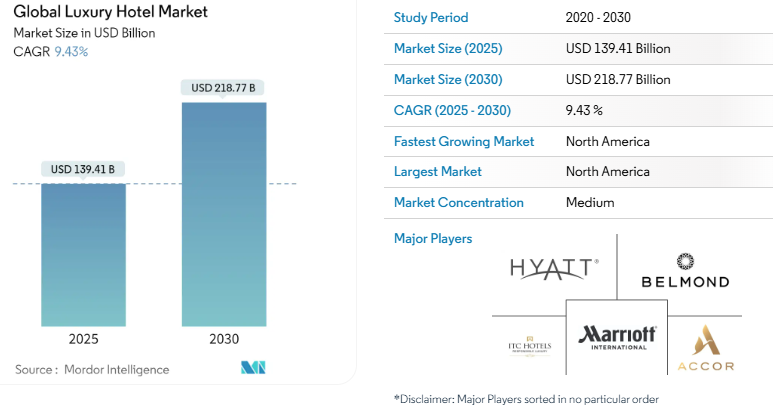Mordor Intelligence has published a new report on the Luxury Hotel Market, offering a comprehensive analysis of trends, growth drivers, and future projections.
The global luxury hotel market is on a trajectory of significant growth, with projections indicating an increase from USD 139.41 billion in 2025 to USD 218.77 billion by 2030, reflecting a Compound Annual Growth Rate (CAGR) of 9.43%. This expansion is driven by evolving consumer preferences, technological advancements, and strategic investments by key industry players. As travelers increasingly seek personalized and unique experiences, the luxury hospitality sector is adapting to meet these sophisticated demands.
Key Trends
Personalization and Unique Guest Experiences
Modern travelers are prioritizing personalized services and distinctive experiences over traditional luxury offerings. This shift has prompted luxury hotels to tailor their services, incorporating local culture, bespoke activities, and customized amenities to enhance guest satisfaction. For instance, properties are offering curated local excursions, personalized wellness programs, and exclusive culinary experiences that reflect regional flavors. This trend underscores the industry’s move towards creating memorable and individualized guest journeys.
Technological Integration and Smart Hospitality
The adoption of advanced technologies is revolutionizing the luxury hotel industry. From AI-powered concierge services to smart room controls, hotels are leveraging technology to streamline operations and elevate the guest experience. Contactless check-ins, mobile room keys, and personalized digital interfaces are becoming standard, catering to the tech-savvy traveler. This technological integration not only enhances convenience but also aligns with health and safety priorities in a post-pandemic world.
Sustainability and Eco-Friendly Practices
Environmental consciousness is increasingly influencing consumer choices, leading luxury hotels to adopt sustainable practices. Initiatives such as reducing carbon footprints, eliminating single-use plastics, and sourcing locally produced goods are becoming prevalent. Guests are showing a preference for accommodations that demonstrate a commitment to environmental stewardship, prompting hotels to integrate eco-friendly designs and operations. This shift towards sustainability reflects a broader trend of responsible luxury.
Report Overview: https://www.mordorintelligence.com/industry-reports/luxury-hotel-market
Market Segmentation
The luxury hotel market is segmented based on type, room capacity, business model, and region.
By Type:
- Business/Commercial Hotels: Catering primarily to corporate travelers, these hotels offer facilities such as conference rooms, high-speed internet, and business centers.
- Resort Hotels: Located in vacation destinations, resorts provide leisure activities, spa services, and recreational facilities, appealing to tourists and families.
- Boutique Hotels: Known for their intimate settings and personalized services, boutique hotels often feature unique themes and designs.
- Casino Hotels: These establishments combine lodging with casino gaming, attracting guests seeking entertainment and luxury.
- Transit Hotels: Situated near airports or transit hubs, they offer short-term accommodations for travelers in transit.
- Bed & Breakfast Hotels: Providing a homely atmosphere, these hotels offer overnight stays with breakfast, often in unique or historic properties.
By Room Capacity:
- Small Hotels: Featuring fewer rooms, these hotels focus on personalized service and exclusivity.
- Medium Hotels: Offering a balanced number of rooms, they combine personalized services with a range of amenities.
- Large Hotels: With a substantial number of rooms, large hotels provide extensive facilities and services to accommodate a high volume of guests.
- Mega Hotels: These expansive properties offer numerous rooms and a wide array of amenities, often including multiple dining options, conference centers, and entertainment venues.
By Business Model:
- Chain Hotels: Part of a larger brand, chain hotels benefit from brand recognition, standardized services, and extensive marketing networks.
- Independent Hotels: These hotels operate autonomously, often emphasizing unique designs and personalized guest experiences to differentiate themselves in the market.
By Region:
- North America: Dominating the market with a significant share, North America’s luxury hotel industry is bolstered by high disposable incomes and a robust tourism sector.
- Europe: Home to a rich cultural heritage, Europe’s luxury hotels attract tourists seeking historical and modern luxury experiences.
- Asia-Pacific: Emerging as a rapidly growing market, driven by increasing affluence and a burgeoning middle class seeking luxury accommodations.
- Middle East & Africa: Known for opulent luxury hotels, particularly in destinations like the UAE, catering to both business and leisure travelers.
- South America: Offering unique luxury experiences, this region is gaining popularity among tourists seeking exotic destinations.
Get a Customized Report Tailored to Your Requirements. – https://www.mordorintelligence.com/market-analysis/luxury-hospitality
Key Players
The global luxury hotel market is characterized by the presence of several prominent players who continually strive to enhance their offerings and expand their market reach. Notable companies include:
- Marriott International, Inc.: As one of the largest hotel chains globally, Marriott offers a diverse portfolio of luxury brands, including The Ritz-Carlton and St. Regis, known for their exceptional service and upscale amenities.
- Hilton Worldwide Holdings Inc.: Operating renowned luxury brands such as Waldorf Astoria and Conrad Hotels & Resorts, Hilton emphasizes personalized experiences and global expansion.
- Hyatt Hotels Corporation: With luxury brands like Park Hyatt and Andaz, Hyatt focuses on delivering unique guest experiences through innovative designs and culinary excellence.
- Accor S.A.: A French multinational hospitality company, Accor’s luxury segment includes brands like Sofitel and Raffles, offering a blend of heritage and contemporary luxury.
- InterContinental Hotels Group (IHG) plc: IHG’s luxury portfolio features brands such as InterContinental and Regent Hotels, known for their global presence and commitment to quality.
These companies are investing heavily in technology integration, sustainability initiatives, and personalized services to cater to the evolving.
Conclusion
The global luxury hotel market is experiencing steady growth, fueled by evolving consumer expectations, technological innovations, and a strong emphasis on sustainability. As travelers seek personalized and unique experiences, luxury hotel brands are adapting to provide tailored services, smart hospitality solutions, and eco-friendly initiatives. With key players investing in expansion and innovation, the industry is poised for continued success, offering an unparalleled blend of comfort, exclusivity, and modern convenience.
Industry Related Reports

